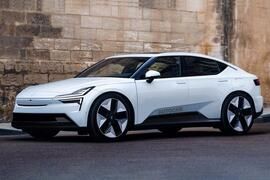 Swedish firm targets significant sales growth with expanded line-up led by crucial new electric SUV
Swedish firm targets significant sales growth with expanded line-up led by crucial new electric SUV
The new Polestar 7 will be a Range Rover Evoque-sized premium SUV and the firm’s first model produced in Europe.
The Swedish firm has confirmed early details of the new EV as part of a revised strategy, which includes a target to grow sales by 30-35% in the coming three years.
The forthcoming 7, previously announced as due in 2027, will essentially serve as a successor to the Polestar 2 liftback, although it won't be a direct replacement, with this announcement hinting it will take more of an overtly SUV-like form.
Polestar boss Michael Lohscheller said that the model would sit in the "biggest and fastest growing" market segment for electric cars, making it a key model in the firm's new growth strategy.
Its new head of design, Philipp Römers, said: “Polestar is known for its progressive design, with each car standing out and creating its own buzz. So too will [the] Polestar 7.”
He added that the new model will be “everything our customers expect from us, both in terms of design and performance”.
Römers said that "every Polestar has a USP" and said that the 7 would have its own strong unique element but declined to give any details.
Polestar has yet to give details on where in Europe the 7 will be produced, but it's known to have been looking at an under-construction Geely plant in Slovakia.
Polestar's profitability target
Former Opel boss Lohscheller was recently named as Polestar's new CEO after Thomas Ingenlath resigned last August after seven years in charge of the Geely-owned brand.
He has now revealed an updated business strategy that involves "significant changes" to improve the firm's operations and financial performance.
Lochscheller said that 2024 had been a transition year for the brand, but he argued that it had strong foundations with "the right cars" in its model line-up, and the focus now was on trying to improve on sales and distribution and also cost-reduction.
The new 3 and 4 EVs accounted for more than half of Polestar's orders in the final quarter of last year, and the firm's line-up will continue to expand with the launch of the Porsche Taycan-rivalling 5 GT due this year.
Lochscheller described the UK-developed 5 as an "amazing sports car". It will be followed at some stage by the 6, a limited-run 2+2 roadster.
Polestar said that plus the arrival of the 7 will help achieve its ambitious plans to boost sales volume by around a third.
Former boss Ingenlath said the 7 was due to arrive in 2027, but Lochscheller gave no details on its intended launch date during his presentation.
Polestar is also aiming to have a positive free cash flow by 2027.
Notably, Polestar will eventually move all of its models onto a single vehicle architecture, which it says will reduce "complexity, costs and investments".
It's unclear whether Polestar will develop a bespoke new platform or use existing platforms. The 2 uses Geely and Volvo's CMA platform (also used by the Volvo EX40), the 3 shares the SPA2 platform with the Volvo EX90 and the 4 uses a version of Geely's SEA architecture. The 5 and 6 are also tipped to use variants of the highly flexible SEA, suggesting it's the most likely candidate to be the focus of Polestar's future line-up.
Lohscheller said: "We are building on the strong Polestar brand with design and performance at its core – but significant changes are needed to make this well-respected progressive brand a successful and viable business."
The firm is also speeding up its retail expansion, with the goal to increase its number of showrooms ('Spaces') by 75% by the end of next year, expanding to 130 locations in Europe and 57 in North America. Lochscheller said that Polestar's emphasis will also shift from a 'storytelling' to help customers learn about the brand to active selling.
Polestar is also set to start selling cars in France, where its launch was delayed by a dispute with Citroën over its logo design.
Adding a European manufacturing presence will also help Polestar to expand the base of its 'asset-light' business model. Originally it made cars exclusively in China, but the 3 is now built alongside the Volvo EX90 in the US and the firm has a production presence in South Korea.
Polestar is also aiming to capitalise on its EV-only line-up by selling CO2 credits to other manufacturers that are striuggling to hit their European Union emissions targets – a tactic that has proven highly profitable for EV-only firms such as Tesla. Lochscheller said that he anticipated that to be worth "triple digit millions" in revenue.